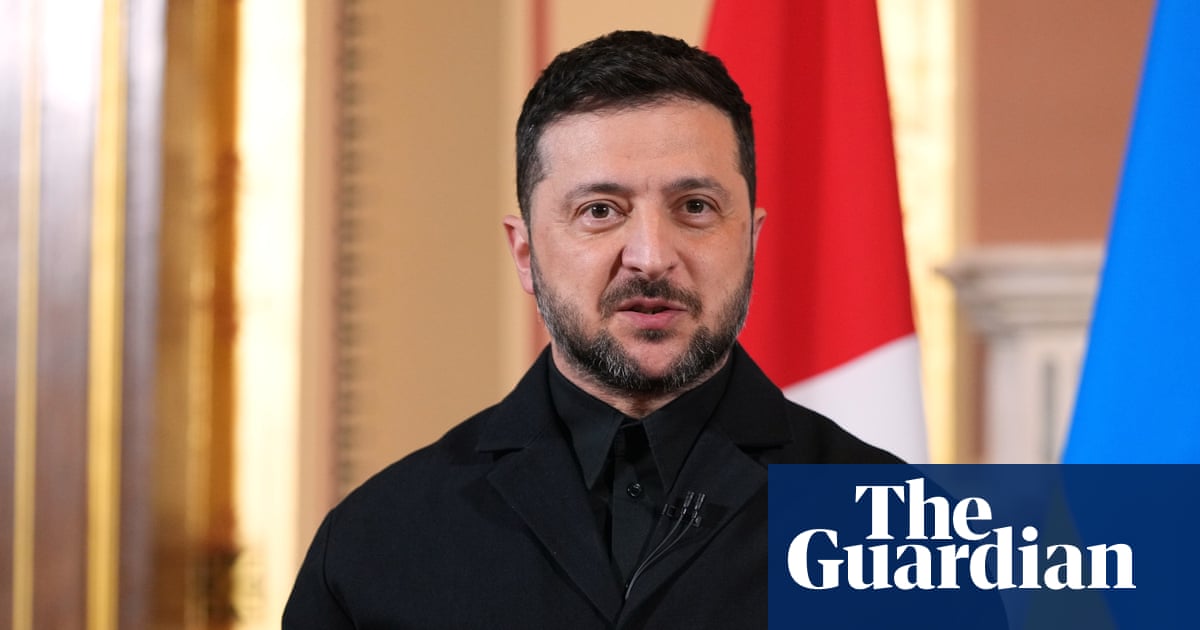
Ukraine war briefing: Zelenskyy urges US to expand Russia oil sanctions | Russia
Ukrainian President Volodymyr Zelenskyy urged the US to expand sanctions on Russian oil from two companies to the whole sector, and appealed for long-range missiles to hit back at Russia. Zelenskyy was in London for talks with two dozen European leaders. The Ukrainian leader said Trump’s decision this week to impose oil sanctions was “a big step,” and said “we have to apply pressure not only to Rosneft and Lukoil, but to all Russian oil companies”.
The Ukrainian leader chose not to overtly lobby for the supply of US Tomahawk cruise missiles at the meeting but instead emphasised the need for the west to work together. British prime minister Keir Starmer, however, said there was more that they could do to bolster Kyiv’s long-range missile capability. “I think there’s further we can do on capability, particularly … long-range capability and, of course, the vital work for coalition of the willing when it comes to the security guarantees that are necessary,” Starmer said.
Zelenskyy’s call for missiles came as Russia again attacked Ukraine with missiles and drones on Saturday. In Dnipropetrovsk, the regional military administration chief said two people were killed and seven more wounded in missile and drone attacks. Moscow also targeted the capital Kyiv, damaging buildings and homes in multiple districts and wounding at least eight people.
Nato secretary general Mark Rutte said he discussed the issue of sending Tomahawk missiles to Ukraine with US president Donald Trump and it is still under review. “On particularly, the Tomahawks, of course, the president and I discussed that. The issue remains under review by the president and again, it’s up to the US to decide,” said Rutte.
The European allies also said frozen Russian assets needed to be used quickly, with Starmer saying there was “absolute clarity” during the meeting that progress on using the frozen assets to fund a loan to support Ukraine must be realised. EU leaders on Thursday stopped short of endorsing a plan to use frozen Russian assets to fund a giant loan to Kyiv, over concerns raised by Belgium, where hundreds of billions of dollars in Russian reserves are held. Moscow has promised a “painful response” if the assets are seized.
Russia’s top economic negotiator arrived in the United States for talks, two days after Washington imposed sanctions on Moscow’s two biggest oil companies. “Arrived in the US to continue the US-Russia dialogue – visit planned a while ago based on an invitation from the US side,” Kirill Dmitriev said on X. Earlier this week Trump scrapped planned talks with Putin in Budapest, saying he did not want a “wasted” meeting. In an interview with CNN, Dmitriev said that a meeting between Donald Trump and Putin will happen but “probably at a later date”.
Dmitriev said in the same interview with CNN that he believes his country, the United States and Ukraine are close to a diplomatic solution to end the war. He did not offer details of what this would entail. European nations are working with Ukraine on a new proposal for a ceasefire in the war along current battle lines, according to Reuters. “It’s a big move by President Zelenskyy to already acknowledge that it’s about battle lines,” Dmitriev said. “You know, his previous position was that Russia should leave completely – so actually, I think we are reasonably close to a diplomatic solution that can be worked out.”
Dmitriev also said he did not believe that the recently imposed US sanctions on Russian oil companies will have a significant impact on the Russian economy because “oil prices in the world will rise and Russia will sell just fewer gallons of oil, but at the higher price.”
The swiftness of the sanctions appeared to catch Moscow off guard, Pjotr Sauer wrote, adding that Putin conceded the sanctions could cost Russia’s economy, telling reporters on Thursday that “some losses are expected”. At the heart of Trump’s current misalignment with Moscow is his demand for an immediate ceasefire that would serve as the basis for peace talks. Trump has also urged both sides to freeze the current frontlines – a proposal supported by Ukraine and its European allies. Putin, however, has firmly ruled out halting the fighting until a comprehensive agreement is reached that addresses what the Kremlin calls the “root causes” of the conflict.
First Appeared on
Source link






